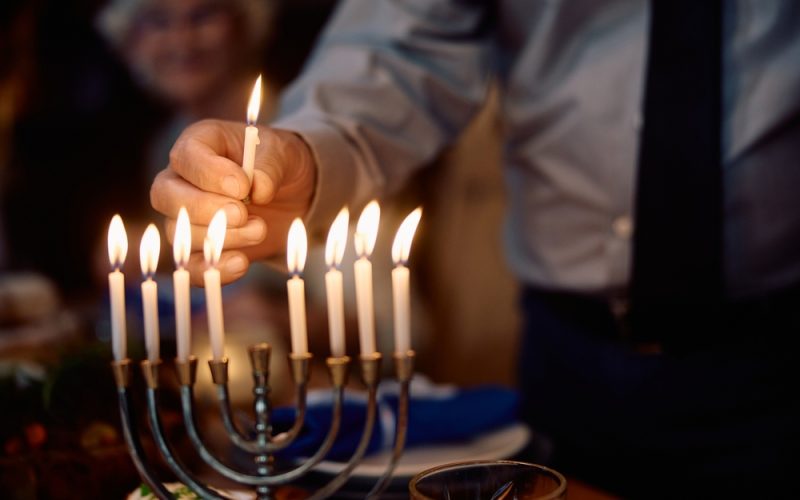The festival of Chanukah commemorates the Maccabees’ victory over the Syrian tyrant Antiochus IV, who had conquered Jerusalem and seized the Temple in his efforts to Hellenize Judea. Resisting assimilation, the Maccabees defeated the Syrian army, and reclaiming the Temple, they kindled again its holy lamps with only a small cruse of oil.
According to the Talmud, Chanukah celebrates the miracle of that oil lasting eight days. But the greater significance remains the Jewish community’s refusal to bend and disappear, or to hide.
Last December, a congregant emailed me a photograph of her living room window decorated with an Israeli flag and a Chanukah menorah. “In my window like you said we’re supposed to do,” she wrote. “I was surprised that some Jews said they were afraid to put the menorah in the window, afraid somebody would smash it. But I am a Michigan Wolverine and we’re fearless.”
During those early weeks of Israel’s war in Gaza, as posters of the hostages were being torn down and Jews whose dress so identified them were being assaulted, the Jewish community awakened to a reality we should have anticipated because we had seen it before: how hatred of Israel is intertwined with hatred of Jews, anti-Zionism with antisemitism. While I admired this congregant’s courage, I understood why others were afraid.
A decade ago, the Jew-hatred we feared most came from the far right, from white nationalists and replacement theorists like Robert Bowers who murdered 11 at Pittsburgh’s Tree of Life Synagogue, and from Islamist extremists.
Until recently, the antisemitism of the left still operated primarily through boycotts, divestment, sanctions, and other insidious channels. It lurked beneath the surface in social exchanges and academic spaces. But this past year it burst into the open, intimidating and menacing, and claiming a right to free expression — nowhere more than on college campuses.
The campus has long been home to activists who conflate the Palestinian-Israeli conflict with other liberation struggles and implicate Israel’s Jewish supporters in every societal injustice.
But for even longer, the academy has harbored educators who exploit the lectern as a pulpit to inveigh against Israel, some employing the grotesque antisemitism of Holocaust inversion characterizing Israel as the Third Reich, others demonizing Israel as a colonialist regime, as if Jewish families who have been living on the land for centuries, or those who arrived from displaced persons camps, had some other home to go back to.
But at some universities today, being a Jew on campus has become an act of courage, every walk to class a gauntlet of verbal bullying and physical harassment. According to an ADL/Hillel survey, 73% of Jewish students claim to have seen or experienced antisemitism in the aftermath of Hamas’s attack. Prior to Oct. 7, 2023, 64% said they had felt comfortable revealing their Jewish identity; after Oct. 7, only 39% did.
Through more history than less, Jews have faced danger. That is why the Talmudic instruction to display the Chanukah menorah is nuanced: “Our rabbis taught: it is incumbent to place the Chanukah lamp by the door of one’s house on the outside. If one dwells in an upper chamber, he places it at the window nearest the street. But in times of danger it is sufficient to place it on the table.” In other words, demonstrate your Jewish identity proudly, if it is safe.
For more than a year, that is the choice many Jews have been compelled to make: to wear their yarmulke in public, or cover it with a baseball cap; to display their Star of David necklace, or tuck it inside their sweater; to brave the walk to synagogue, or tune in online.
In 1993, Billings, Montana endured a rash of white supremacist activity culminating in a December attack on a Jewish home, where a brick was thrown through a window with a menorah in it. The city responded in remarkable fashion. Residents of all faiths and of no faith at all placed pictures of Chanukah menorahs, published in the Billings Gazette for that purpose, in their windows. Together, the city beat back the forces of hate.
Fortunately, most Jews I know have responded like my proud congregant, the Michigan Wolverine. They have chosen not to be intimidated. And on Chanukah they will light the candles and place them in their windows for all to bear witness to the enduring miracle of Jewish survival.
But what a statement it would make for other New Yorkers to take a page out of the Billings Gazette and do it too!
Davidson is the senior rabbi of Congregation Emanu-El of the City of New York.








